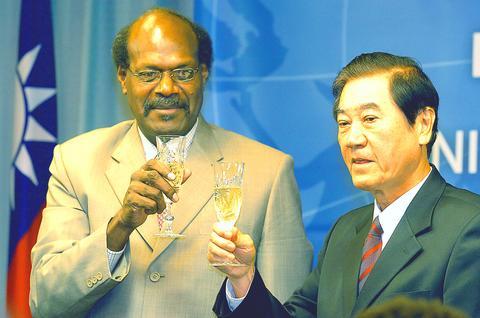The Ministry of Foreign Affairs (MOFA) announced yesterday that Taiwan and Vanuatu have established diplomatic ties after 12 years of intense effort.
Minister of Foreign Affairs Mark Chen (

PHOTO: GEORGE TSORNG, TAIPEI TIMES
Fifteen minutes later, Chen and Vohor announced the news at a hastily called press conference. Fearing interference from China, the ministry has kept Vohor's visit to Taipei and the two countries' preparations to forge ties strictly secret.
Taiwan and the South Pacific island nation signed an agreement to recognize each other in 1992. Vohor was the foreign minister of Vanuatu at that time. In 2000, the two countries' plan to establish official relations was reportedly aborted due to premature media exposure.
"Vanuatu does not mean to provoke China by establishing diplomatic ties with Taiwan. We hope we can still be China's friend. Nevertheless, I have no power to predict or stop China's reaction to this [Vanuatu's official relations with Taiwan]," Vohor told reporters through an interpreter.
27th ally
Vanuatu, which becomes Taiwan's 27th ally, still maintains diplomatic relations with China. Beijing had made no official response to the development as of press time yesterday.
Vohor said Vanuatu wanted to establish official relations with Taiwan after the two sides recognized each other in 1992, but had encountered some "obstacles" along the way.
"Now I have become the prime minister. It is the will and hope of the people of Vanuatu to establish diplomatic ties with Taiwan ? Vanuatu is a sovereign country and has the right to make its own decision," Vohor said.
The Joint Communique said Taiwan and Vanuatu will forge closer bilateral cooperation in the areas of agriculture, aviation, tourism, fishery, aquaculture, education, culture, cattle farming, capacity building, medical cooperation, and the development of small and medium enterprises in the years to come.
Strong support
Vohor committed Vanuatu to giving strong support for Taiwan to participate in international organizations, including the UN, the World Health Organization, APEC and other regional organizations such as the Pacific Islands Forum and the South Pacific Tourism Organization, the document said.
Chen, who gave a general introduction to Vanuatu in a presentation, commended the country's stable political system and said he wished Vanuatu could soon become a popular destination for Taiwanese tourists.
Taiwan's diplomats have started working in Vanuatu and the two sides will deploy ambassadors as soon as possible, Chen said.
President Chen Shui-bian (
A senior official involved in preparations to establish ties with Vanuatu said the country's negative economic growth over the past few years and limited foreign aid from China, Australia and New Zealand were among the main factors motivating it to seek help from Taiwan.
Vanuatu's determination to establish official ties with Taiwan was further strengthened after witnessing the fast economic development in neighboring country Kiribati, which forged diplomatic relations with Taiwan last November, the official said.
Vohor, who was elected by the country's parliament in July, is eager to revive the economy, according to the official.

MORE VISITORS: The Tourism Administration said that it is seeing positive prospects in its efforts to expand the tourism market in North America and Europe Taiwan has been ranked as the cheapest place in the world to travel to this year, based on a list recommended by NerdWallet. The San Francisco-based personal finance company said that Taiwan topped the list of 16 nations it chose for budget travelers because US tourists do not need visas and travelers can easily have a good meal for less than US$10. A bus ride in Taipei costs just under US$0.50, while subway rides start at US$0.60, the firm said, adding that public transportation in Taiwan is easy to navigate. The firm also called Taiwan a “food lover’s paradise,” citing inexpensive breakfast stalls

TRADE: A mandatory declaration of origin for manufactured goods bound for the US is to take effect on May 7 to block China from exploiting Taiwan’s trade channels All products manufactured in Taiwan and exported to the US must include a signed declaration of origin starting on May 7, the Bureau of Foreign Trade announced yesterday. US President Donald Trump on April 2 imposed a 32 percent tariff on imports from Taiwan, but one week later announced a 90-day pause on its implementation. However, a universal 10 percent tariff was immediately applied to most imports from around the world. On April 12, the Trump administration further exempted computers, smartphones and semiconductors from the new tariffs. In response, President William Lai’s (賴清德) administration has introduced a series of countermeasures to support affected

CROSS-STRAIT: The vast majority of Taiwanese support maintaining the ‘status quo,’ while concern is rising about Beijing’s influence operations More than eight out of 10 Taiwanese reject Beijing’s “one country, two systems” framework for cross-strait relations, according to a survey released by the Mainland Affairs Council (MAC) on Thursday. The MAC’s latest quarterly survey found that 84.4 percent of respondents opposed Beijing’s “one country, two systems” formula for handling cross-strait relations — a figure consistent with past polling. Over the past three years, opposition to the framework has remained high, ranging from a low of 83.6 percent in April 2023 to a peak of 89.6 percent in April last year. In the most recent poll, 82.5 percent also rejected China’s

PLUGGING HOLES: The amendments would bring the legislation in line with systems found in other countries such as Japan and the US, Legislator Chen Kuan-ting said Democratic Progressive Party (DPP) Legislator Chen Kuan-ting (陳冠廷) has proposed amending national security legislation amid a spate of espionage cases. Potential gaps in security vetting procedures for personnel with access to sensitive information prompted him to propose the amendments, which would introduce changes to Article 14 of the Classified National Security Information Protection Act (國家機密保護法), Chen said yesterday. The proposal, which aims to enhance interagency vetting procedures and reduce the risk of classified information leaks, would establish a comprehensive security clearance system in Taiwan, he said. The amendment would require character and loyalty checks for civil servants and intelligence personnel prior to